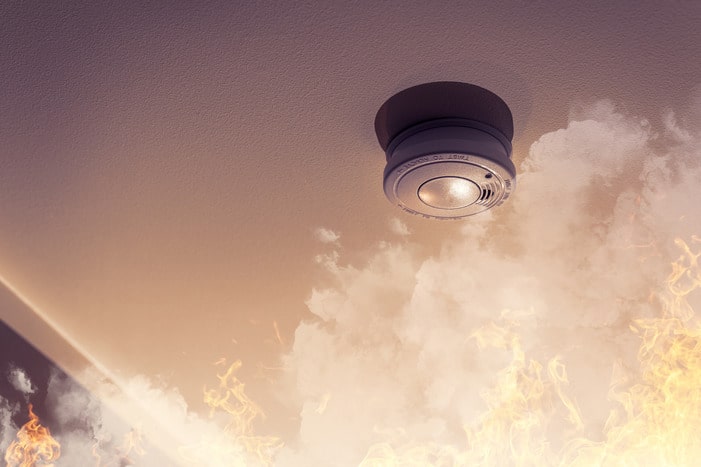
- July 4, 2023
- |security guard company
- | 0
Fire Detection Systems and Equipment –
As a trusted fire watch guard company, XPressGuards understands the critical role of fire detection systems and equipment in safeguarding lives and property. Early detection of fire incidents is essential for timely response and effective mitigation. In this article, we will explore the various fire detection systems and equipment used by fire watch guards to enhance safety and enable a swift response in the event of a fire emergency.
1. Smoke Detectors
Smoke detectors are one of the most common and effective fire detection systems used by fire watch guards. These devices are designed to detect the presence of smoke particles in the air. Smoke detectors can be either ionization-based or photoelectric-based, each with its own advantages and applications. Ionization smoke detectors are more responsive to fast-flaming fires, while photoelectric smoke detectors are better at detecting slow, smoldering fires. Fire watch guards ensure regular inspection and maintenance of smoke detectors, including battery replacement and testing to ensure optimal performance.
2. Heat Detectors
Heat detectors are designed to sense rapid increases in temperature. They can be classified into two types: fixed temperature detectors and rate-of-rise detectors. Fixed temperature detectors activate when the ambient temperature exceeds a predetermined threshold, while rate-of-rise detectors trigger an alarm when the temperature rises rapidly within a short period. Heat detectors are particularly useful in areas where smoke detectors may not be suitable due to excessive dust, fumes, or high humidity. Fire watch guards ensure the proper installation and periodic testing of heat detectors to ensure their reliability.
3. Flame Detectors
Flame detectors are specialized devices used to detect the presence of open flames. These detectors use various technologies, such as ultraviolet (UV), infrared (IR), or combination detectors, to identify flames. Flame detectors are highly effective in environments where fire incidents may not produce significant smoke or heat, such as fuel storage areas or chemical processing plants. Fire watch guards are trained to identify the specific flame detection systems installed and understand their operation to promptly respond to flame-related incidents.
4. Gas Detectors
Gas detectors are vital in environments where the presence of combustible or toxic gases poses a fire hazard. These detectors monitor the air quality and can detect the buildup of flammable gases, such as natural gas, propane, or methane. Gas detectors are crucial in industrial settings, laboratories, or areas where gas pipelines are present. Fire watch guards ensure the proper calibration and functionality of gas detectors and respond promptly if gas leaks or abnormal gas concentrations are detected.
5. Fire Alarm Systems
Fire alarm systems integrate various detection devices, including smoke detectors, heat detectors, flame detectors, and gas detectors, to provide comprehensive coverage and early warning of fire incidents. These systems typically include control panels, annunciators, and audible/visual alarms. Fire watch guards are trained to operate and respond to fire alarm systems, verifying the alarm, initiating emergency procedures, and coordinating with local fire departments. Regular testing and maintenance of fire alarm systems are essential to ensure their reliable operation.
6. Manual Call Points
Manual call points, also known as fire alarm pull stations, are crucial components of fire detection systems. These devices allow occupants or fire watch guards to manually activate the fire alarm system in the event of a fire emergency. Manual call points are strategically located near exits and throughout the facility to ensure easy access. Fire watch guards are responsible for regularly inspecting and ensuring the proper functionality of manual call points.
7. Fire Suppression Systems Activation Devices
Fire watch guards may encounter fire suppression systems, such as sprinkler systems or gaseous suppression systems, during their duties. These systems are designed to extinguish or control fires automatically. Fire watch guards must be familiar with the activation devices associated with these systems, such as sprinkler heads, flow switches, or discharge nozzles. They ensure that these devices are unobstructed, well-maintained, and ready for immediate operation in the event of a fire incident.
8. Portable Fire Extinguishers
Portable fire extinguishers are essential tools used by fire watch guards to respond swiftly to small fires before they escalate. Fire watch guards undergo training in the proper use of fire extinguishers, including understanding fire classifications, selecting the appropriate extinguisher for the fire type, and employing the correct extinguishing techniques. Fire watch guards regularly inspect fire extinguishers, ensuring they are fully charged, accessible, and free from damage.
Fire detection systems and equipment are vital resources utilized by fire watch guards to enhance safety and enable a swift response in the face of fire emergencies. From smoke detectors and heat detectors to flame detectors and gas detectors, these systems play a crucial role in early fire detection, providing valuable time for evacuation and mitigating potential damages.
XPressGuards remains committed to equipping highly trained fire watch guards with the necessary knowledge and expertise to effectively utilize fire detection systems and equipment, ensuring the utmost safety and security for all. Contact us to learn more.


